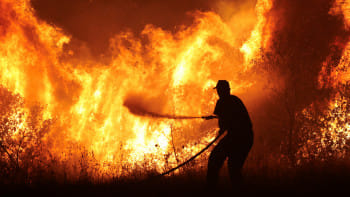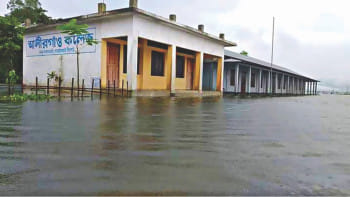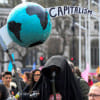Are we apes fighting over a burning planet?

How do we cope with an unending series of polycrises facing the world? This summer was the hottest ever recorded with daily reports of floods and natural disasters. The AI revolution is disrupting jobs and business. The media fog of war in Ukraine is so bad that no one knows who is winning or losing, except that thousands are dying or being maimed by the day. Debt is reaching distress levels, even as interest rates remain high.
Geopolitically, the UN Secretary-General is calling the situation an "unhinged world" because nothing was agreed upon at the last UN Security Council meeting, when only President Biden was the sole leader present out of five permanent members. No one seemed to be in charge of global security.
In almost all areas needing global cooperation, such as dealing with recession, food security and AI regulation, trust and action are lacking. So far only 12 percent of the 17 UN Sustainable Development Goals (SDG) for 2030 have been met.
The state or market are top-down solutions, whereas, throughout history, mass change has often been bottom-up, through diverse societies and communities finding their own way out of natural or human challenges, sometimes through revolution.
This feeling of dystopia means that few can trust any leader to lead us out of the looming apocalypse. The issues are so multi-dimensional that no single solution is adequate. Climate warming is a complex system that changes humanity and the planet simultaneously. There is no silver bullet solution because it involves human behavioural change that is hardwired to excessive consumption, powered by debt printing, which increases carbon emissions and ecological destruction.
Even as scientists warned about the physical dimension of climate warming, economists were sanguine because they thought that the solution was either through the state imposing carbon taxes or trading carbon credits or debits so that the market would solve the problem. Since businesses control politics, most democracies refuse to impose carbon taxes, and without governments to impose the right regulations, carbon markets are in disarray, if not outright scams.
What are we to do?
The state or market are top-down solutions, whereas, throughout history, mass change has often been bottom-up, through diverse societies and communities finding their own way out of natural or human challenges, sometimes through revolution. The British historian Arnold Toynbee argued that civilisation evolved through "challenge and response". Western civilisation will fail when its elites refuse to deal with the challenges of natural disasters or social corruption and injustices.
Most people do not understand why they have to fix carbon emissions, whereas their daily priority is to get enough income to feed their families. The politicians have not made clear that protecting Human Capital (our well-being) and Natural Capital (the planetary well-being) are one and the same thing. This is rightly recognised by Pope Francis, in his latest Apostolic Exhortation "Laudate Deum" as "our care for one another and our care for the earth are intimately bound together." Quite rightly, the Pope sees climate change as a moral challenge.
However, he also recognised that our current technocratic paradigm seeking limitless growth and economic power has gone awry. "The ethical decadence of real power is disguised thanks to marketing and false information, useful tools in the hands of those with greater resources to employ them to shape public opinion."
Change management is not rocket science. Corporate management consultants know that transforming business models involves shared values, ownership of the need for change, a strategy to effect change and institutional/organisational reforms that incentivise the change. The complexity facing global change is the scale and diverse scope of communities, cultures and values with different resources and histories.
Ultimately, any change involves sacrifices and trade-offs, which is why it takes leadership who will take the risks and also raise funding to effect the transformation. Since climate disasters affect the poor the most, which exacerbates social injustice, we need to address how to raise incomes to alleviate social inequality, whilst at the same time tackling the stresses on the environment.
As the book Buying Time for Climate Action showed, there is already readily available technical and organisational know-how, as well as global funding, to effect the SDGs. Most of the know-how exists in universities and businesses but is not available readily for the millions of villages and small social activists to effect change. The digital divide is also the poverty divide.
I can only conclude that it is the profit model of business that has ignored climate change for too long. It took 10 years for the business sector to realise that climate change is not an expense reducing their profits, but a profit opportunity. As long as they are still making money, because central banks are willing to print to provide the profit illusion, little will change.
UNCTAD's latest Trade and Development Report 2023 showed how the top four global companies in food trading, accounting for nearly 70 percent of the global food market share, registered a dramatic rise in profits during 2021-2022. The same has happened with fertiliser, energy, pharmaceuticals and other key commodities, even as billions struggle to access basic access to food and health.
The rich West has become more selfish and protective of its status quo. Even Sweden, formerly a generous exemplar of funding development aid, has decided to cut such aid, due to pressure from its new right-wing government. Effectively, Sweden and other European countries will cut their commitments to providing 0.7 percent of GDP annual Overseas Development Aid (ODA) partly to finance their NATO defence spending commitment of 2 percent of GDP.
Are we apes fighting over a burning planet?
As long as the rich West is unwilling to take the risk of funding and leading the rest in global climate action and addressing social inequities, it has lost the moral right to be the world leader. And the corruption of morality by the rich elites is exactly what historian Arnold Toynbee attributed to the decline and fall of civilisations.
If top leaders and business captains are not willing to listen to the Pope's sincere plea to his global flock of 1.3 billion Catholics, and essentially anyone with a moral conscience, we are all doomed to be boiled frogs.
Andrew Sheng is a distinguished fellow of Asia Global Institute, University of Hong Kong, and chief adviser to the China Banking Regulatory Commission.
Views in this article are the author's own.
Follow The Daily Star Opinion on Facebook for the latest opinions, commentaries and analyses by experts and professionals. To contribute your article or letter to The Daily Star Opinion, see our guidelines for submission.

 For all latest news, follow The Daily Star's Google News channel.
For all latest news, follow The Daily Star's Google News channel. 












Comments